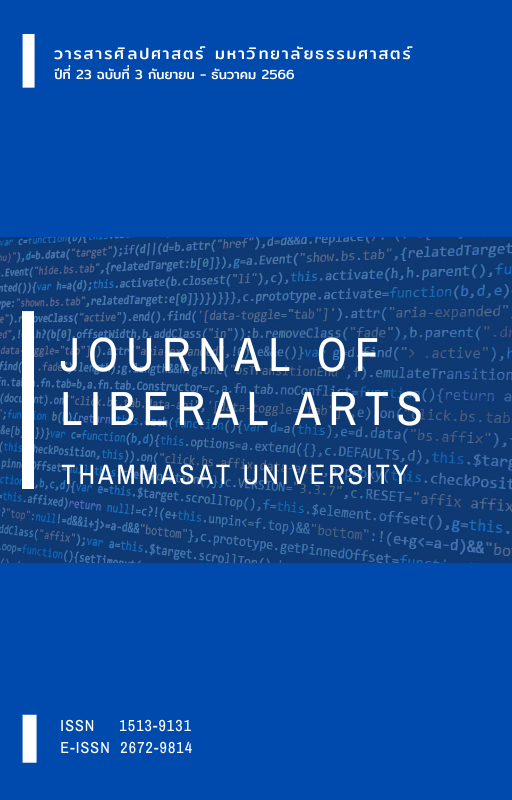ความสำคัญของวิชาการฝึกงานต่อการพัฒนาทักษะทางปัญญาและทักษะทางพฤติกรรมนักศึกษาวิชาเอกภาษาญี่ปุ่น
Main Article Content
บทคัดย่อ
งานวิจัยนี้มีวัตถุประสงค์เพื่อศึกษาว่าวิชาการฝึกงานมีความสำคัญต่อนักศึกษารวมถึงหลักสูตรอย่างไร โดยศึกษาประเด็นที่เกี่ยวข้องกับทักษะทางปัญญาและทักษะทางพฤติกรรมของนักศึกษา เพื่อนำผลการวิจัยมาปรับปรุงพัฒนานักศึกษาให้เป็นบุคลากรคุณภาพถึงพร้อมทุกด้านยิ่งขึ้น ข้อมูลที่ใช้ในการศึกษามาจากความคิดเห็นของผู้เกี่ยวข้อง ได้แก่ นักศึกษาฝึกงาน และหน่วยงานที่รับนักศึกษาฝึกงาน ผลการศึกษาพบว่าเป้าหมายการฝึกงานของนักศึกษามีทั้งส่วนที่เกี่ยวข้องกับทักษะทางปัญญา และทักษะทางพฤติกรรม หลังการฝึกงาน นักศึกษาประเมินตนเองว่าสามารถบรรลุเป้าหมายที่ตั้งไว้ และพึงพอใจการฝึกงานในระดับ “มาก” ผู้ประกอบการคาดหวังทักษะทางปัญญาและทักษะทางพฤติกรรมจากนักศึกษาฝึกงานในระดับ “มาก” โดยความคาดหวังทักษะทางพฤติกรรมสูงกว่าทักษะทางปัญญาเล็กน้อย ด้านผลประเมินการฝึกงาน แม้ค่าเฉลี่ยผลประเมินทักษะทางปัญญาและทักษะทางพฤติกรรมของนักศึกษาหลังการฝึกงานต่ำกว่าความคาดหวัง แต่ไม่มีนัยสำคัญเชิงสถิติ เมื่อพิจารณารายข้อพบว่า นักศึกษามีทักษะการสื่อสารต่ำกว่าที่ผู้ประกอบการคาดหวังในทุกกลุ่มงาน จากผลการศึกษาสามารถสรุปได้ว่าการฝึกงานช่วยชี้ให้เห็นข้อควรปรับปรุงสำหรับนักศึกษาและหลักสูตรชัดเจนขึ้นและสะท้อนการจัดการเรียนการสอนในปัจจุบันที่ยังไม่สามารถพัฒนาให้นักศึกษามีทักษะการสื่อสารที่ดีมีประสิทธิภาพได้ การพัฒนาทักษะทางพฤติกรรมโดยเฉพาะทักษะการสื่อสารจึงเป็นประเด็นที่ท้าทายหลักสูตรในการหาวิธีการเสริมสร้างทักษะการสื่อสารให้มีประสิทธิภาพมากยิ่งขึ้นตามที่ผู้ประกอบการคาดหวัง
Downloads
Article Details

อนุญาตภายใต้เงื่อนไข Creative Commons Attribution-NonCommercial-NoDerivatives 4.0 International License.
เอกสารอ้างอิง
ประกาศกระทรวงการอุดมศึกษา วิทยาศาสตร์ วิจัยและนวัตกรรม เรื่อง กำหนดปรัชญาการอุดมศึกษาไทยและระบบอุดมศึกษาใหม่ ด้านการสร้างบัณฑิตและพัฒนากำลังคน. (27 พฤษภาคม 2564). ราชกิจจานุเบกษา. เล่ม 138 ตอนพิเศษ 144 ง. หน้า 2.
วราลี จันทโร และ ธนภัส สนธิรักษ์. (2563). การวิเคราะห์ปัญหาด้านการใช้ภาษาญี่ปุ่นที่พบในการฝึกงาน: กรณีศึกษาผู้เรียนวิชาเอกภาษาญี่ปุ่น. วารสารเครือข่ายญี่ปุ่นศึกษา, 10(1), 65-82.
สาขาวิชาภาษาญี่ปุ่น. (2560). ผลการสำรวจความคิดเห็นของบัณฑิตสาขาวิชาภาษาญี่ปุ่น มหาวิทยาลัยธรรมศาสตร์. มหาวิทยาลัยธรรมศาสตร์, คณะศิลปศาสตร์.
สาขาวิชาภาษาญี่ปุ่น. (2561). หลักสูตรศิลปศาสตรบัณฑิต สาขาวิชาภาษาญี่ปุ่น หลักสูตรปรับปรุง พ.ศ. 2561. มหาวิทยาลัยธรรมศาสตร์, คณะศิลปศาสตร์.
สำนักงานปลัดกระทรวงการอุดมศึกษา วิทยาศาสตร์ วิจัยและนวัตกรรม, สำนักมาตรฐานและประเมินผลอุดมศึกษา. (2560). เกณฑ์มาตรฐานหลักสูตรระดับอุดม พ.ศ. 2558 และเกณฑ์มาตรฐานที่เกี่ยวข้อง. วงศ์สว่างพับลิชชิ่ง แอนด์ พริ้นติ้ง.
Ahuja, A., Netto, C. L. M., Terrana, A., Stein, G. M., Kern, S. E., Steiner, M., Kim, R., & Walsh, K. K. (2022). An outcomes-Based framework for integrating academics with student life to promote the development of undergraduate students’ non-cognitive skills. Frontiers in Education, 7, 1-8. https://doi.org/10.3389/feduc.2022. 782214
Bjorklund-Young, A. (2016). What do we know about developing students’ non-cognitive skills?. Institute for Education Policy, John Hopkins School of Education. 1-8. https://jscholarship.library.jhu.edu/bitstream/handle/1774.2/63014/noncognitiveskillsmastheadfinal.pdf?sequence=1&isAllowed=y
Brunello, G., & Schlotter, M. (2011). Non cognitive skills and personality traits: Labour market relevance and their development in education & training systems. IZA Discussion Paper, 5743, 1-45.
Farrington, C. A., Roderick, M., Allensworth, E., Nagaoka, J., Keyes, T. S., Johnson, D. W., & Beechum, N. O. (2012). Teaching adolescents to become learners. The role of non-cognitive factors in shaping school performance: A critical literature review. University of Chicago Consortium on Chicago School Research. https://www.kipp.org/wp-content/uploads/2016/11/Teaching_Adolescents_to_Become_Learners.pdf
Grover, S. M. (2005). Shaping effective communication skills and therapeutic relationships at work. AAOHN Journal, 53(4), 177-182.
Heckman, J. J., Stixrud, J., Urzua, S. (2006). The Effects of Cognitive and noncognitive abilities on labor market outcomes and social behavior. Journal of Labor Economics. 24(3), 411-482.
Hong-ngam, J. (2012). Effects of cognitive and non-cognitive skills on earning outcomes: A case of Khonkaen province of Thailand. NIDA Economic Review, 6(2), 1-22.
Iwai, T. (2019). A study of internship among university freshman and university sophomore -the relationship between support from others and motivation to learn independently-. Bulletin of the Japan Society of Internship, 21, 11-19. (in Japanese)
Kai Zhou. (2016). Non-cognitive skills: Definitions, measurement and malleability. Paper commissioned for the Global Education Monitoring Report 2016, Education for people and planet: Creating sustainable futures for all.
Kawano, S. (2011). Effectiveness of internship on Learning Outcomes of Students in humanities and social sciences - the case of Waseda University-. Japanese Society of Internship, 14, 9-15. (in Japanese)
Kubota, A. (2004) Saabisu Nihongo to iu kangaekata: kankou toshi hawai de no nihongo kyouiku no genjou kara kangaeru. Showa joshi daigaku daigakuin nihongo kyouiku kenkyuu kiyou, 2, 65-69. (in Japanese)
Kyllonen, P. C. (2012). The importance of higher education and the role of noncognitive attributes in college success. Pensam. Educ, 49(2), 84-100. https://doi.org/10.7764/PEL.49.2.2012.7
Miura, K. (2016). A study on the educational effects of internship – from the point of view of employment awareness effect and learning motivation effect-. Japanese Society of Internship, 19, 1-10. (in Japanese)
Miyata, H. (2021). Trends and Issues in Internship Research at Universities. Japanese Society of Internship, 24, 81-89. (in Japanese)
Nyhus, E. K., & Pons, E. (2005). The effects of personality on earnings. Journal of Economic Psychology, 26(3), 363-384. https://doi.org/10.1016/j.joep.2004.07.001


